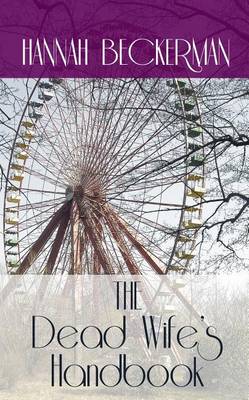Reviewed by Leah on
Chick Lit fans are always going to be a bit wary of a novel about a dead person. It just isn’t the Chick Lit style, is it? So far, I’ve found them to be amazing reads, personally. I can now add The Dead Wife’s Handbook to my list of favourite ghost-type Chick Lit. The Dead Wife’s Handbook is clever in so many ways. Firstly, it’s divided in to all the parts of grief people generally go through – denial, anger, acceptance, bargaining etc, which is a very clever tactic, and breaks up the book quite nicely. I sort of also liked how the book didn’t go into too much detail about where Rachel was. Instead, the book, quite rightly, took the approach that Rachel was in this place, and every so often a white light would appear/disappear and she would be able to view what was going on in the real world, as opposed to the ‘purgatory’ if you will of where she found herself. It was basically the story of how a dead wife had to see her husband and daughter move their life on, and it was all very real.
I was sort of torn over Rachel. I liked her, don’t get me wrong, but without sounding daft (or perhaps missing the point) she seemed superflous to the story. I understand she was there to watch over Max and Ellie, and I actually loved her narration, but the book would have also worked if she wasn’t there (but with a different title, and er, premise sorta. I’ve just convinced myself the book did need Rachel). But on the other hand, if Rachel hadn’t been part of the book, it wouldn’t have been half as emotional, and boy was it. The worst case of grief I’ve ever had to go through was losing my dog and that was bloody awful, so I can’t imagine what it’s like to not be able to see your kid any more. Or worse, to see your kid and not be able to do anything. Unbearable. It was so hard sometimes to keep reading about all these wonderful memories Rachel had, and to see her answering her loved ones but without them being able to hear, it was just devastating. Plus, that purgatory place sounds HORRIBLE.
My absolute favourite parts of the novel were the interactions between Max and Ellie. What they go through is so awful, so life-changing and I loved how they muddled through together, with family stepping in where necessary (but not overstepping, which was also pretty cool). Dads aren’t always given the best rap in books, but I would happily have Max as my dad, he was amazing. So whenever Rachel was judging him for something, I did cringe, like when it came to his new friend Eve, I felt Max judged his timing of everything quite well – as well as you can, when you’re factoring in how an 8-year-old grief-stricken girl will react and to see Rachel pounding on him was hard, because I felt she was quite judgemental. I could see her points of view as a mother, but on the other hand, she wasn’t the one going through the terrible loss and having to make life worth living again, so how do you judge when it’s OK to move on? It’s like people say, time’s a healer. It did create some friction for me, because I was actually Team Max. As you can see The Dead Wife’s Handbook tied me up in knots. I really, really enjoyed it, but there were definitely some times when I questioned the novel – all good novels should provoke questions, right? It was such a good book, Beckerman is an amazing writer, and this is one of the most beautiful portrayals of grief I will probably ever read. It totally lived up to the hype, and then some.
Reading updates
- Started reading
- 5 February, 2014: Finished reading
- 5 February, 2014: Reviewed
